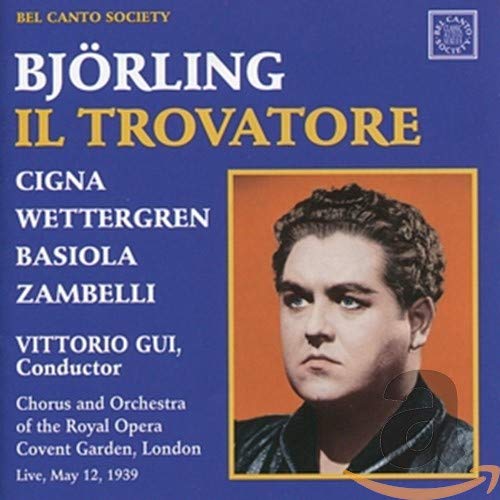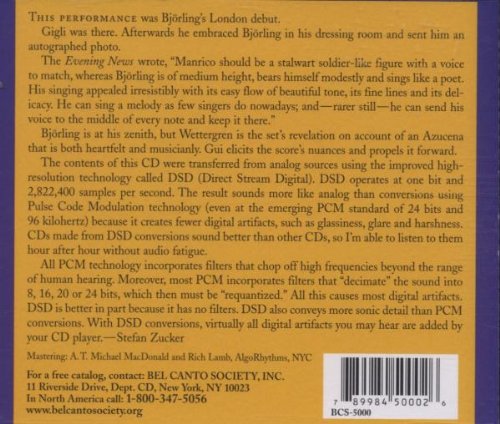Customer Services



Verdi: Il Trovatore
I**R
Fabulous Historically Informed Performance Demonstrates Greatness of Trovatore
This is a fabulous, if unusual, performance of one of Verdi's most popular operas. Set aside all your preconceptions about big voices blasting familiar melodies and be ready to listen to the way this recording, taken from a live performance, reveals Trovatore to you. From the opening base and chorus scene, a passage I invariably find boring in the theatre, this performance totally enraptured me. The clarity with which the score is executed starts with the beginning, giving close attention to the structure of the music, the score not only becomes revealed, but the drama inherent in the way it was composed is developed bar to bar. Orchestra and voices are well balanced; the cast is well integrated and familiar with the stylistic conventions of the period. Embelishments are freely but always tastefully applied. From Leonora's first act aria we become aware that Simone Kermes is an exceptional soprano performing wonders with very familiar music in a way you are likely not to have heard before but will mesmerize you even if it may make dear Zinka turn over in her grave. When di Luna appears, we know we have a light baritone, well balanced with our Leonora, and when Manrico sings his serenade, we have a light tenor (a Don Ottavio) doing beauties with the music. Since the voices are so well equalized, one realizes that the blasting and bellowing is here not missed at all as what is being revealed is the beauty of the music. This way one appreciates Karajan's great fondness for and appreciation of the greatness of this score, even if he never would dream of conducting it this way. Indeed, it is melody practically after melody, with very little recitative in between. Musically and dramatically my favourite scene in the opera occurs when the soldiers capture Azucena, and here it is a wonder with the drama being sorted out between the characters (Yvonne Naef a magnificent Azucena) while the violins, high on the orchestra execute one of Verdi's most felicitous melodies that I never tire of hearing and always hope to hear well highlighted in a performance of the opera. Here every aspect of this rather complex scene is clearly, emotionally and beautifully executed. What about Di Quella Pira by a somewhat tenore-di-grazia, Herbert Lippert is excellent with a fine high C at the end of the choral accompanied cabaletta (the aria does not include Verdi's repeat and nor is there an interpolated high C in the "madre infelice" verse). "D'amor sull' ali rosee" is certainly one of the great tests Verdi ever posed for a dramatic-coloratura soprano. It calls for highly disciplined, classical singing of immense lyricism, flawless coloratura, and, gives the soprano bragging rights if she has the high E-flat Verdi wrote, but also a lower, also coloratura, option should the lady not have the note.....Verdi could be a most understanding composer. Simone Kermes does not disappoint, indeed it is a perfect and most feeling execution of the score, following Verdi's high note option and being masterful throughout. This aria is Leonora's most difficult moment in the opera; my absolute favorite among performances of the aria remains Maria Callas, also with the high option, from Naples in 1951 under Serafin, followed by Monserrat Caballé (no high E-flat) from Covent Garden under Guadagno in 1975. After these two ladies I would place Simone Kermes, and then the rest including Zinka and Leontyne. BUT this is indeed only the beginning of a miraculously constructed act, as the aria is followed by the Miserere, of which my favourite has always been Caruso with Frances Alda. Well, certainly that is very different with what we get here which is all of a piece with everything that has preceded it, beautifully in its rhythmic continuity, with substantial choral support, and, peculiarly, a totally non-tuned tolling bell (why this realistic touch is beyond me? maybe they used a real bell rather than metal tubes.... obviously that little detail bothered me). "Tu Vedrai" is given, perhaps it almost becomes a cabaletta to the Aria and Miserere concertante that has come before..... I think it is played that way. From there on to the finale all is brought to its tragic conclusion, the music driving us there with Azucena most moving in her "Ai nostril monti" and the finale all of a piece with each character's participation in the denoument clearly delineated by the music. It is a masterpiece of an opera. It is a masterpiece of a performance, amply rewarded by the huge ovations from the audience at the end, and at select moments throughout. The architect of this marvel: Michael Hofstetter, the conductor of the splendid Chor und Orchester der Ludwigsburger Schlossfestpiele. Every lover of Verdi should have this alternative view of Trovatore in their collection.
H**R
trovatore like you've never heard it
It's been more than 6 months since I purchased this CD when there were no AMZ reviews available, but I'd heard outtakes on a German internet radio opera program, and was much impressed, and so bought it. Having heard it all, the recording still strikes me as amazing in several ways, one being that I am apparently the first to bother posting a review (and I rarely post any AMZ reviews). I've heard 'Can Belto' Trovatore renditions many times on audio and video recordings, and a few times live in opera houses including the biggest in the U.S. (i.e., the Met), but this is an honest to goodness Bel Canto rendition, probably closer I believe to what Verdi expected and heard at the time of its premier than anything to be found in big houses today. It's a concert performance by a 'period band' in a regional house, but the recording is fine and the audience properly respectful and enthusiastic. Besides the conductor and the orchestra, the stars are the Leonora Kermes and the Azucena Naef, the latter of whom delivers the required chest notes, a decent successor to the driven, divine Fiorenza Cossotto. But Kermes does things, probably as Verdi expected, with the soprano part that you will never hear in a big house. I don't mean to demean the males on the recording, they are quite listenable, my only personal complaint would be with the Count di Luna, just because his voice type is miscast, not nearly evil-deep enough, not because of any defects in his musicianship.
H**S
Trovatore Light. Too damn light.
Thumbs down for this one, much as I wanted to like it. With the exception of Naef, the principal voices simply aren't there. The mic doesn't often favor them, true enough, but they let the music down time after time. Kermes, the principal villain in this endeavor, thoroughly trivializes her assignment, embellishing the first verse of Tacea la notte with irrelevant frippery instead of establishing the melody, elsewhere smudging pitch in her vain attempts to bludgeon us, gently, with "charm." Charm? In Trovatore? The two brothers sort of sound alike, for once, but their voices have no profile. The Count is at least rhythmically accurate, but the Troubador might as well have spoken his role, and there is nothing about his (unwritten) high C that would have warranted its inclusion in the sole verse provided of Di quella pira. At least he doesn't attempt the trills in Ah si, ben mio, not that he was likely tempted. The audience, which goes wild every time a number ends loudly, have evidently never heard real Verdi singing. The conducting does have its terriffic moments, at times impressively acute in ensemble, and one wishes, as often happens, that Ferrando ha a bit more singing to do. I almost feel like recommending the thing as an example of sheer perversity, and shall keep my copy for that reason, but when one might have Callas's Mexico City Trovatore, or Gencer and del Monaco, or Price and Corelli --and Ettore Bastianini, in any number of settings-- ? Nah. I'l keep my perversity to myself.
R**K
"Il Trovatore" to succeed must have four great singers and in this release that has been achieved
"Il Trovatore" to succeed must have four great singers and in this release that has been achieved. I never heard Franco Corelli live (much to my regret) and find his recordings exciting and blazing with passion. He is in fine voice on this Opera Legacies release and his 'Di quella pira' rightly brings the house down. Stella with crystal-clear diction and total commitment to every moment of her Leonora is superb and Bastianini's voice with It's juicy sound is exciting and gloriously sung. Cossotto then early in her career gives plenty of sparks flying amidst multi-tudinous decibels - Who could ask for more...............Gavazzeni leads the La Scala forces with total commitment and I highly recommend this recording...................................The sound naturally being live is variable though totally listenable.
P**O
na
satisfactory
B**V
Very good quality.
Dear Amazon! Thank you very much! CD OK! Very good quality.
B**V
Five Stars
Thank you very much!
T**E
Four Stars
astrid like always very very good and interesting
A**O
Espectacular
Esta versión en vivo de 1962, dirigida por el gran Karajan, y con dos de las voces mas perfectas que hayan habido para los roles de Manrico y Leonora, es simplemente una joya.La calidad de la grabación no es perfecta, pero muy mejorada si se compara con versiones piratas anteriores.Leontyne Price arranca algo insegura, pero luego es un huracán. Es una pena que su dicción del italiano (y del francés) haya sido siempre defectuosa. La pronunciación de la "r" nunca fue lo suyo, pero para mi es todo perdonable cuando escuchas tanta perfección vocal.Corelli es simplemente perfecto para el rol. Su "Di quella pira" es insuperable. El brillo de su voz es algo pocas veces utilizado con tanta efectividad.De Karajan nada que agregar. Excelente.
Trustpilot
1 day ago
2 days ago